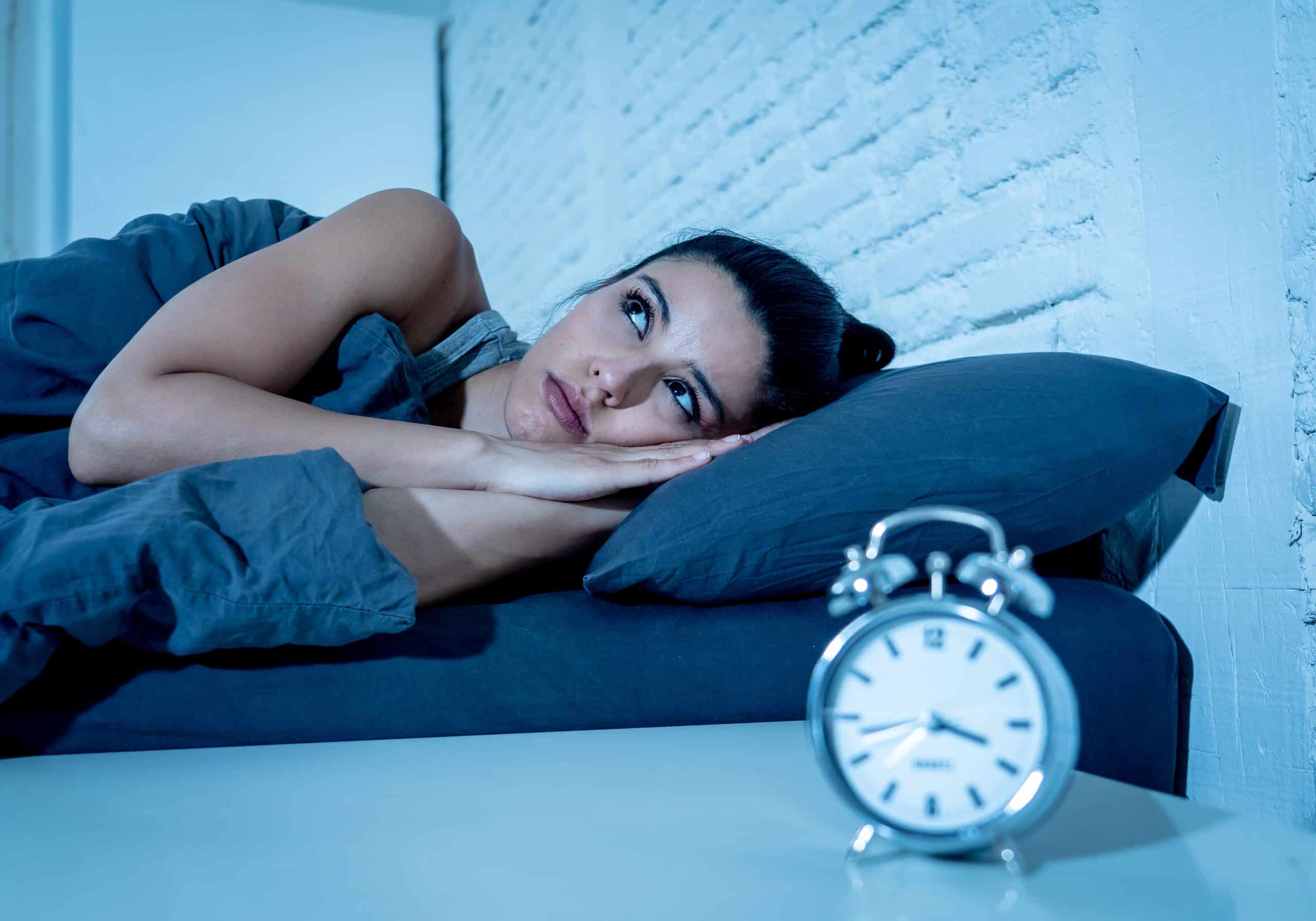Insomnia Weight Loss
When trying to lose weight, many pay attention to dieting and exercise as the core factors for fast and effective weight loss. However, have you ever considered that sleep could also contribute to how much pounds you shed or gain? Is insomnia weight loss a viable option, or do you need to sleep more to shed weight?
How Bad Is Insomnia For Weight Loss?
Let no one lie to you that insomnia weight loss is a viable thing. Insomnia and poor sleep are extremely bad for weight loss. Besides a healthy diet and exercise, sleep is also quite important in helping you shed off those extra pounds. For a successful weight loss journey, it is advisable to try and get at least 7 hours of uninterrupted sleep each night (21).
Here is how insomnia or poor sleep affects your weight:
-
Insomnia Can Increase Your Appetite
Lack of sleep affects your hormones, which leads to overeating. Ghrelin and leptin are the two hormones in our bodies that regulate hunger. Ghrelin stimulates your appetite, while leptin decreases it. Any time you are sleep deprived, ghrelin levels go up while leptin levels fall, leading you to snack and overeat.
-
Poor Sleep Boosts The Production Of Endocannabinoids
This lipid is released in the body, especially in the evening. When you are sleep-deprived, due to the increase of endocannabinoid in your blood, you are likely to get hungry, craving sugary and carbohydrate-laden foods, such as cookies, candy, and chips (19).
Read More: Meditation For Insomnia: Best Techniques To Ensure A Good Night’s Sleep
-
It Raised Levels Of Cortisol
Sleep deprivation leads to increased levels of cortisol in the body the next day (17). Increased levels of this hormone lead to sugar cravings, causing you to snack on sugary, fatty foods that will prompt weight gain. Cortisol also slows down your metabolism, making it harder to burn calories which, instead, are turned into fat and stored in the body (12).
-
Lack Of Sleep Increases Your Calorie Intake
We all know that you need to eat at a calorie deficit of 500 to 1000 calories a day to lose weight. However, due to the increase of ghrelin in the blood you are most likely to eat more than you should. A controlled trial done in 2010 showed that subjects who slept for just four hours a night ate an average of 559 more calories than those who had 8 hours of uninterrupted sleep (1).
-
A Sleepy Brain Makes Poor Decisions
Insomnia dulls activity in the brain’s frontal lobe, which is the locus of decision-making and impulse control. When you are well-rested, you are aware enough to say no to that bowl of pasta or pint of ice-cream. However, when you are sleep deprived, your brain seeks the feeling of comfort. This leads to you opting to skip your diet and not count calories and pick all the high fat, high sugar, and high carbohydrate foods that hinder your weight loss.
-
Insomnia And Poor Sleep Slow Down Your Metabolism
Lack of enough sleep interferes with how your body produces insulin. This hormone is in charge of turning foods and sugar into energy. When it is interfered with, your body will not use food consumed as energy but will instead store it as fat (2).
Reasons why BetterMe is a safe bet: a wide range of calorie-blasting workouts, finger-licking recipes, 24/7 support, challenges that’ll keep you on your best game, and that just scratches the surface! Start using our app and watch the magic happen.

Why Does Insomnia Cause Weight Loss?
If you have not been sleeping at all (or not very well) while simultaneously losing weight and are wondering, “Can insomnia cause weight loss?” The answer is no. Insomnia weight loss is not a thing. In fact, lack of enough sleep can stall your weight loss and promote weight gain.
It might be best to consider other factors that could be causing this. If you have not been actively looking to lose weight, here are some factors that affect unexplained weight loss (20):
1. Addison’s Disease
This illness occurs when your adrenal glands do not produce enough hormones. Fatigue, insomnia, and weight loss are just some of the signs and symptoms of this disease.
2. Cancer
Many cancer patients also experience insomnia and weight loss due to illness, pain, and medication.
3. Celiac Disease
Caused by sensitivity to gluten, it can cause weight loss, among many more symptoms.
4. Chronic Obstructive Pulmonary Disease
This is a chronic inflammatory lung disease that causes obstructed airflow from the lungs. As the disease progresses, many patients start losing weight. They can also find it hard to sleep due to their obstructed airways.
5. Crohn’s Disease
This is an inflammatory bowel disease that affects your small intestine or colon. Fatigue, insomnia, weight loss, and reduced appetite are just some of the symptoms that one experiences. It should be noted that poor sleep is quite common when the disease flares up and can continue even when the other symptoms have settled down (4).

6. Depression
Fatigue, insomnia, and weight loss are some of the most common signs and symptoms of depression.
7. Hypercalcemia
Overactive parathyroid glands cause the calcium level in your blood to rise above normal levels. This affects, among other things, your digestive system, which could lead to weight loss.
8. Hyperthyroidism
An overactive thyroid produces too much thyroxine, which leads to insomnia and weight loss. This unintentional weight loss occurs even when your appetite and food intake stays the same or increases. Hyperthyroidism is one of the main causes of weight loss and insomnia.
BetterMe app will provide you with a host of fat-frying fitness routines that’ll scare the extra pounds away and turn your body into a masterpiece! Get your life moving in the right direction with BetterMe!

What Causes Sudden Weight Gain And Hair Loss Insomnia?
As seen above, an overactive thyroid can cause you to lose sleep and weight in equal measure. On the other hand, an underactive thyroid may lead to a slew of problems with your health. In regards to sleep, hypothyroidism may cause:
- Obstructive sleep apnea – This is caused by an enlargement of the tongue or disruption of the muscles that control the upper airway. Patients may experience excessive daytime sleepiness, apathy, and feeling lethargic.
- Insomnia – Due to the sleep apnea caused by the dysfunctioning thyroid, you may experience disrupted breathing leading to sudden and frequent arousal from sleep, especially during REM sleep. Sometimes the situation could get worse, leading to chronic insomnia (2).
Can A Low-Carb Diet Cause Insomnia?
Ordinarily, high-carb diets are the ones that cause insomnia. This is due to the refined carbohydrates, especially sugars, that can be found in this eating plan. Sugary foods can raise your blood sugar, which, in turn, triggers the release of insulin. Once your blood sugar drops, it leads to the release of hormones such as adrenaline and cortisol, which can interfere with sleep (8).
That being said, a low-carb diet could still lead to cases of insomnia. For example, the keto diet is celebrated for its weight loss results, but it sometimes causes a lack of sleep during the first few weeks (3). However, if you’re not specifically on a keto diet but are still eating low-carb you may still suffer from insomnia or disturbed sleep.
This could be because of the types of carbs that you are consuming. Whole grains such as oats, quinoa, and starchy carbs like beans, lentils, peas, and starchy vegetables could help you sleep better. It is also important to note that not all diets are good for you. Studies have found that a low-carb diet can cause insomnia and sleep apnea. Men who eat less than 50 percent of carbs in their diet could also have trouble staying asleep through the night (13).

Things You Can Do To Help You Fight Insomnia And Sleep Better
1. Avoid Caffeine In The Afternoon
Having some coffee or tea in the afternoon may affect your sleep later in the night. While you might not end up having insomnia, the caffeine will prevent you from getting a deep, restful sleep that we all need (16).
2. Exercise More
While many people have a burst of adrenaline and energy after a working out, the opposites might also happen. Exercise done in the afternoon or later in the day may trigger body-heating effects. After exercising, your body temperature drops, and this could help you to fall asleep. Also, if your insomnia is triggered by anxiety or depression, working out is a good relief for this as well (9).
3. Switch Off Your TV And Computer
This should be done at least an hour before your bedtime. This allows you to settle down and relax, letting you fall asleep. Plus, you will not be tempted to watch ‘just one more episode’.
4. Leave Your Computer In The Living Room
This allows you to preserve your bedroom for sleep and relaxation. If you do not have enough space, for example, you live in a studio apartment, try your best not to work from your bed. This area should be kept away from your work obligations and could help you sleep better.
5. Try Having A Bedtime Routine
Your routine should involve simple relaxing tasks such as taking a bath, meditating, or doing your skincare. Such easy tasks make you relax, enabling you to fall asleep much easier.
6. Space Out Your Meal And Bedtime
It is advisable to always have your meals two to three hours before you have to sleep. This allows your food to travel to the small intestines preventing heartburn when you lie down and other sleep disturbances (10). However, it is important to note that not all foods are bad for your sleep, just avoid heavy meals right before bed.
7. Stick To A Sleep-Wake Up Schedule
Waking up and going to bed at the same time every day helps condition your body to start shutting down at a specific time of the night. This makes it easier for you to fall asleep each night.
8. Switch Off The Lights
Unless you have a crippling fear of the dark, it is best to switch off all your lights before sleeping. Lying in a dark room alerts your body’s sleep-wake cycle that it is time to sleep.
9. Leave Your Phone Alone
Have you ever looked up from your phone and suddenly realized that it is 3 am? Before getting into bed, switch off your phone, put it on ‘Do Not Disturb’ or airplane mode, and do not reach for it again.
10. Take Note Of Your Medication
Some over the counter and prescription medicine contain hidden traces of caffeine that could keep you awake if you took them at night. Always take a minute to check the labels or drug information sheets of your medicines to see if they can cause bouts of insomnia.
11. Cut Down On Your Alcohol Intake, Especially At Night
Not only does alcohol contain empty calories that can cause weight gain, but it also messes with how well you sleep. At the initial stage, alcoholic drinks may make you feel sleepy, but this effect fades fast. If you do drink at night, try and ensure that your last glass is taken four hours before your set bedtime (11).

Foods To Help You Sleep Better
While eating close to your bedtimes is generally not a good idea, some foods are the exception to the rule. Having small quantities of these foods before heading to bed could actually boost your ability to sleep well through the night, which translates to more weight loss.
-
Milk
Having a warm glass of milk before bed has long been linked to enabling you to sleep better. Milk itself has melatonin (hormone) and tryptophan (amino acid), two factors that help induce sleep. It is also suspected that milk has some psychological reasons as to why it promotes sleep. It is suspected that it reminds one of their mother providing milk at bedtime (14).
Read More: Is Drinking Milk Before Bed Good For Weight Loss: The Truth About This Calcium-Packed Drink
-
Kiwi Fruit
Having 2 kiwi fruits 1 hour before sleeping could be the answer to your insomnia issues. Research done in 2011 showed that consuming this fruit at night may improve sleep onset, duration, and efficiency in adults with self-reported sleep disturbances (6). It is believed that high levels of serotonin and antioxidants could contribute to their sleep-inducing capabilities.
-
Tart Cherries
In 2018, a small controlled trial showed that drinking some cherry juice before bed had significant benefits towards fighting insomnia by increasing sleep time and efficiency. Patients with insomnia stated that they slept for 84 minutes more after consuming the juice. Like milk, cherries have high amounts of melatonin and tryptophan (15).
-
Fatty Fish
Oily fish is usually recommended for persons trying to lose weight as it is high in omega 3 fatty acids and low in calories. Other than these benefits, fish, especially salmon, may be quite beneficial to your sleep efficiency and quality (7).
-
Chamomile Tea
It is widely regarded as a mild tranquilizer and sleep-inducer. Its sedative effects are suspected to be due to the flavonoid, apigenin that binds to benzodiazepine receptors in the brain (5).
-
Walnuts
They may promote sleep as they are high in melatonin and other compounds such as serotonin and magnesium.
-
Almonds, Pistachios, And Cashews
They too are considered as good foods to help you sleep. They all contain varying amounts of melatonin, magnesium, and zinc that help fight insomnia.

Exercises To Help You Sleep Better
Apart from food and healthy behaviors before bed, you can try some simple exercises that can help calm you down and lure you to sleep. Please note that any exercise done before heading to sleep should not be a high impact workout. This will just do the opposite and keep you awake.
1. Take a walk after supper. This has helped persons with chronic insomnia sleep better and longer.
2. Try foam rolling. This can simulate a massage helping you relieve any muscle tightness, soreness, and inflammation, which might make it harder for you to fall asleep.
3. Try some late-night yoga. A good session warms up your body, deepens your flexibility, builds your strength, mellows your mind with meditation, and wraps you up with some relaxation, all factors that can pot you in a relaxed mood for sleep (22).
Here are some good yoga poses that you could try every night for restful sleep:

Wide-Knee Child’s Pose
- Kneel on the floor. Touch your big toes together and sit on your heels, then separate your knees about as wide as your hips.
- Exhale and lay your torso down between your thighs. Your hips should point toward the navel so that they nestle down onto the inner thighs.
- Lay your hands on the floor alongside your torso, palms up, and release the fronts of your shoulders toward the floor. Feel how the weight of the front shoulders pulls the shoulder blades wide across your back.
- Stay in this position for 30 seconds to 3 minutes.
- To come up, first, lengthen the front torso, and then with an inhalation lift from the tailbone as it presses down and into the pelvis.
Corpse Pose
- Start by lying down on your back. Separate your legs, letting go of holding your legs straight so that your feet can fall open to either side.
- Bring your arms alongside your body, but slightly separated from your torso. Turn your palms to face upwards and let the fingers curl in.
- Tuck your shoulder blades onto your back for support.
- Once you have set up your limbs, release any effort from holding them in position. Relax your whole body, including your face. Let your body feel heavy.
- Let your breathing occur naturally. Try to remain in the moment by concentrating on your breathing.
- Stay in this position for 5 to 10 minutes.
- To come out, first begin to deepen your breath. Then begin to wiggle your fingers and toes to slowly reawaken your body.
- Stretch your arms overhead for a full-body stretch from hands to feet.
- Bring your knees into your chest and roll over to one side, keeping your eyes closed. Use your bottom arm as a pillow while you rest in a fetal position for a few breaths.
- Bring yourself back up into a sitting position using your hands for support.
The Bottom Line
Insomnia weight loss is not something that has been founded or proved by science. Instead, insomnia and poor sleep tend to make you gain weight. These two factors mess with your body, hunger, satiety, and stress hormones, which makes you disregard your calorie intake, leading to overeating. On the other hand, insomnia also triggers your brain, insulin, and metabolism negatively, further prompting weight gain, making it harder to lose weight.
If you notice that you are not sleeping well and are losing weight, do not be tempted to believe that this is a good thing. Instead, make an appointment to see a doctor and find out what could be causing this, as more often than not, it is a disease that has serious implications.
DISCLAIMER:
This article is intended for general informational purposes only and does not address individual circumstances. It is not a substitute for professional advice or help and should not be relied on to make decisions of any kind. A licensed physician should be consulted for diagnosis and treatment of any medical conditions. Any action you take upon the information presented in this article is strictly at your own risk and responsibility!
SOURCES:
- Acute partial sleep deprivation increases food intake in healthy men (2010, pubmed.ncbi.nlm.nih.gov)
- Can Your Thyroid Gland and Thyroid Hormones Cause Sleep Disorders? (2020, verywellhealth.com)
- Can’t Sleep on Keto? It Might Be Keto Flu — or These 3 Other Reasons (2020, livestrong.com)
- Causes of sleep disturbances in IBD patients (2014, crohnsandcolitis.org.uk)
- Chamomile: A herbal medicine of the past with bright future (2011, ncbi.nlm.nih.gov)
- Effect of kiwifruit consumption on sleep quality in adults with sleep problems (2011, pubmed.ncbi.nlm.nih.gov)
- Fish consumption, sleep, daily functioning, and heart rate variability (2014, pubmed.ncbi.nlm.nih.gov)
- How diet may lead to insomnia (2019, medicalnewstoday.com)
- How does exercise help those with chronic insomnia? (2020, sleepfoundation.org)
- How Long to Wait Before Sleeping After Eating (2020, verywellhealth.com)
- How Long to Wait Between Drinking Alcohol and Bedtime (2020, verywellhealth.com)
- How Stress Can Cause Weight Gain (2020, verywellmind.com)
- I Can’t Sleep on a Low-Carb Diet (2019, livestrong.com)
- Milk Collected at Night Induces Sedative and Anxiolytic-Like Effects and Augments Pentobarbital-Induced Sleeping Behavior in Mice (2015, pubmed.ncbi.nlm.nih.gov)
- Pilot Study of the Tart Cherry Juice for the Treatment of Insomnia and Investigation of Mechanisms (2018, pubmed.ncbi.nlm.nih.gov)
- Sleep and Weight Gain (2013, webmd.com)
- Sleep loss results in an elevation of cortisol levels the next evening (1997, pubmed.ncbi.nlm.nih.gov)
- Sleep More, Weigh Less (2020, webmd.com)
- The Connection Between Sleep and Overeating (2020, sleepfoundation.org)
- Unexplained weight loss (2020, mayoclinic.org)
- Why More Sleep Can Help You Lose Weight (2020, verywellhealth.com)
- Yoga for better sleep (2020, health.harvard.edu)






















